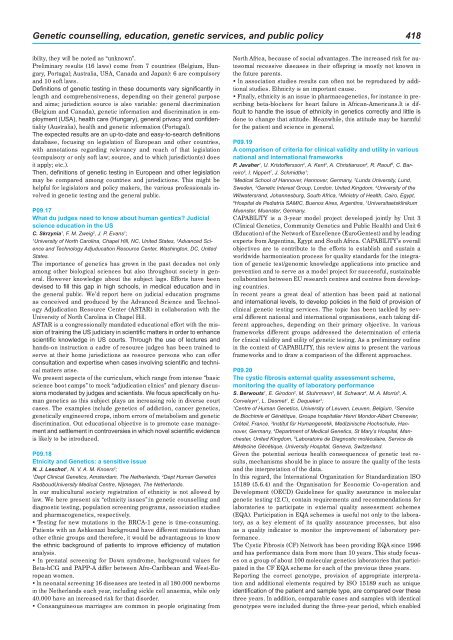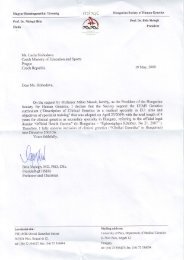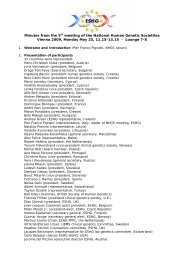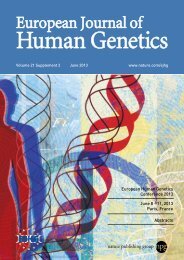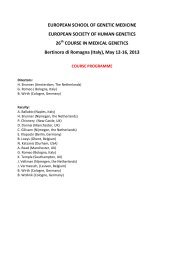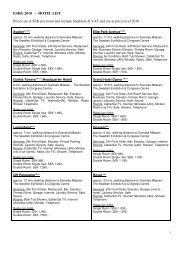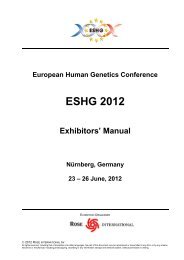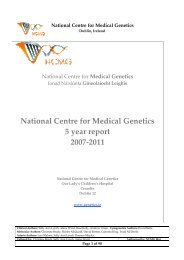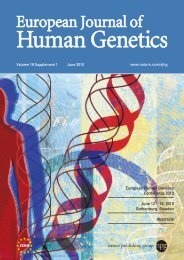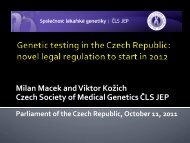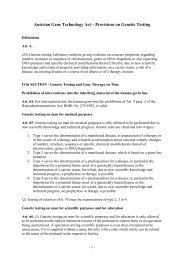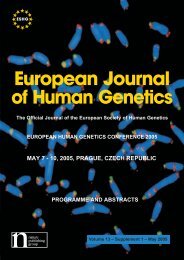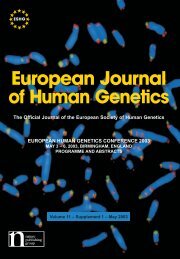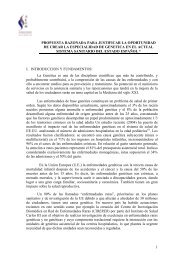2008 Barcelona - European Society of Human Genetics
2008 Barcelona - European Society of Human Genetics
2008 Barcelona - European Society of Human Genetics
You also want an ePaper? Increase the reach of your titles
YUMPU automatically turns print PDFs into web optimized ePapers that Google loves.
Genetic counselling, education, genetic services, and public policy<br />
ibility, they will be noted as “unknown” .<br />
Preliminary results (16 laws) come from 7 countries (Belgium, Hungary,<br />
Portugal; Australia, USA, Canada and Japan): 6 are compulsory<br />
and 10 s<strong>of</strong>t laws .<br />
Definitions <strong>of</strong> genetic testing in these documents vary significantly in<br />
length and comprehensiveness, depending on their general purpose<br />
and aims; jurisdiction source is also variable: general discrimination<br />
(Belgium and Canada), genetic information and discrimination in employment<br />
(USA), health care (Hungary), general privacy and confidentiality<br />
(Australia), health and genetic information (Portugal) .<br />
The expected results are an up-to-date and easy-to-search definitions<br />
database, focusing on legislation <strong>of</strong> <strong>European</strong> and other countries,<br />
with annotations regarding relevancy and reach <strong>of</strong> that legislation<br />
(compulsory or only s<strong>of</strong>t law; source, and to which jurisdiction(s) does<br />
it apply; etc .) .<br />
Then, definitions <strong>of</strong> genetic testing in <strong>European</strong> and other legislation<br />
may be compared among countries and jurisdictions . This might be<br />
helpful for legislators and policy makers, the various pr<strong>of</strong>essionals involved<br />
in genetic testing and the general public .<br />
P09.17<br />
What du judges need to know about human gentics? Judicial<br />
science education in the Us<br />
C. Skrzynia 1 , F. M. Zweig 2 , J. P. Evans 1 ;<br />
1 University <strong>of</strong> North Carolina, Chapel Hill, NC, United States, 2 Advanced Science<br />
and Technology Adjuducation Resource Center, Washington, DC, United<br />
States.<br />
The importance <strong>of</strong> genetics has grown in the past decades not only<br />
among other biological sciences but also throughout society in general<br />
. However knowledge about the subject lags . Efforts have been<br />
devised to fill this gap in high schools, in medical education and in<br />
the general public . We’d report here on judicial education programs<br />
as conceived and produced by the Advanced Science and Technology<br />
Adjudication Resource Center (ASTAR) in collaboration with the<br />
University <strong>of</strong> North Carolina in Chapel Hill .<br />
ASTAR is a congressionally mandated educational effort with the mission<br />
<strong>of</strong> training the US judiciary in scientific matters in order to enhance<br />
scientific knowledge in US courts. Through the use <strong>of</strong> lectures and<br />
hands-on instruction a cadre <strong>of</strong> resource judges has been trained to<br />
serve at their home jurisdictions as resource persons who can <strong>of</strong>fer<br />
consultation and expertise when cases involving scientific and technical<br />
matters arise .<br />
We present aspects <strong>of</strong> the curriculum, which range from intense “basic<br />
science boot camps” to mock “adjudication clinics” and plenary discussions<br />
moderated by judges and scientists. We focus specifically on human<br />
genetics as this subject plays an increasing role in diverse court<br />
cases . The examples include genetics <strong>of</strong> addiction, cancer genetics,<br />
genetically engineered crops, inborn errors <strong>of</strong> metabolism and genetic<br />
discrimination . Out educational objective is to promote case management<br />
and settlement in controversies in which novel scientific evidence<br />
is likely to be introduced .<br />
P09.18<br />
Etnicity and <strong>Genetics</strong>: a sensitive issue<br />
N. J. Leschot1 , N. V. A. M. Knoers2 ;<br />
1 2 Dept Clinical <strong>Genetics</strong>, Amsterdam, The Netherlands, Dept <strong>Human</strong> <strong>Genetics</strong><br />
RadboudUniversity Medical Centre, Nijmegen, The Netherlands.<br />
In our multicultural society registration <strong>of</strong> ethnicity is not allowed by<br />
law . We here present six “ethnicity issues”:in genetic counselling and<br />
diagnostic testing, population screening programs, association studies<br />
and pharmacogenetics, respectively .<br />
Testing for new mutations in the BRCA-1 gene is time-consuming .<br />
Patients with an Ashkenazi background have different mutations than<br />
other ethnic groups and therefore, it would be advantageous to know<br />
the ethnic background <strong>of</strong> patients to improve efficiency <strong>of</strong> mutation<br />
analysis .<br />
In prenatal screening for Down syndrome, background values for<br />
Beta-hCG and PAPP-A differ between Afro-Caribbean and West-<strong>European</strong><br />
women .<br />
In neonatal screening 16 diseases are tested in all 180 .000 newborns<br />
in the Netherlands each year, including sickle cell anaemia, while only<br />
40 .000 have an increased risk for that disorder .<br />
Consanguineous marriages are common in people originating from<br />
North Africa, because <strong>of</strong> social advantages . The increased risk for autosomal<br />
recessive diseases in their <strong>of</strong>fspring is mostly not known in<br />
the future parents .<br />
In association studies results can <strong>of</strong>ten not be reproduced by additional<br />
studies . Ethnicity is an important cause .<br />
Finally, ethnicity is an issue in pharmacogenetics, for instance in prescribing<br />
beta-blockers for heart failure in African-Americans .It is difficult<br />
to handle the issue <strong>of</strong> ethnicity in genetics correctly and little is<br />
done to change that attitude . Meanwhile, this attitude may be harmful<br />
for the patient and science in general .<br />
P09.19<br />
A comparison <strong>of</strong> criteria for clinical validity and utility in various<br />
national and international frameworks<br />
P. Javaher1 , U. Krist<strong>of</strong>fersson2 , A. Kent3 , A. Christianson4 , R. Raouf5 , C. Barreiro6<br />
, I. Nippert7 , J. Schmidtke1 ;<br />
1 2 Medical School <strong>of</strong> Hannover, Hannover, Germany, Lunds University, Lund,<br />
Sweden, 3Genetic Interest Group, London, United Kingdom, 4University <strong>of</strong> the<br />
Witwatersrand, Johannesburg, South Africa, 5Ministry <strong>of</strong> Health, Cairo, Egypt,<br />
6 7 Hospital de Pediatría SAMIC, Buenos Aires, Argentina, Universitaetsklinikum<br />
Muenster, Muenster, Germany.<br />
CAPABILITY is a 3-year model project developed jointly by Unit 3<br />
(Clinical <strong>Genetics</strong>, Community <strong>Genetics</strong> and Public Health) and Unit 6<br />
(Education) <strong>of</strong> the Network <strong>of</strong> Excellence (EuroGentest) and by leading<br />
experts from Argentina, Egypt and South Africa . CAPABILITY’s overall<br />
objectives are to contribute to the efforts to establish and sustain a<br />
worldwide harmonisation process for quality standards for the integration<br />
<strong>of</strong> genetic test/genomic knowledge applications into practice and<br />
prevention and to serve as a model project for successful, sustainable<br />
collaboration between EU research centres and centres from developing<br />
countries .<br />
In recent years a great deal <strong>of</strong> attention has been paid at national<br />
and international levels, to develop policies in the field <strong>of</strong> provision <strong>of</strong><br />
clinical genetic testing services . The topic has been tackled by several<br />
different national and international organisations, each taking different<br />
approaches, depending on their primary objective . In various<br />
frameworks different groups addressed the determination <strong>of</strong> criteria<br />
for clinical validity and utility <strong>of</strong> genetic testing . As a preliminary outline<br />
in the context <strong>of</strong> CAPABILITY, this review aims to present the various<br />
frameworks and to draw a comparison <strong>of</strong> the different approaches .<br />
P09.20<br />
The cystic fibrosis external quality assessment scheme,<br />
monitoring the quality <strong>of</strong> laboratory performance<br />
S. Berwouts 1 , E. Girodon 2 , M. Stuhrmann 3 , M. Schwarz 4 , M. A. Morris 5 , A.<br />
Corveleyn 1 , L. Desmet 1 , E. Dequeker 1 ;<br />
1 Centre <strong>of</strong> <strong>Human</strong> <strong>Genetics</strong>, University <strong>of</strong> Leuven, Leuven, Belgium, 2 Service<br />
de Biochimie et Génétique, Groupe hospitalier Henri Mondor-Albert Chenevier,<br />
Créteil, France, 3 Institut für <strong>Human</strong>genetik, Medizinische Hochschule, Hannover,<br />
Germany, 4 Department <strong>of</strong> Medical <strong>Genetics</strong>, St Mary’s Hospital, Manchester,<br />
United Kingdom, 5 Laboratoire de Diagnostic moléculaire, Service de<br />
Médecine Génétique, University Hospital, Geneva, Switzerland.<br />
Given the potential serious health consequences <strong>of</strong> genetic test results,<br />
mechanisms should be in place to assure the quality <strong>of</strong> the tests<br />
and the interpretation <strong>of</strong> the data .<br />
In this regard, the International Organization for Standardization ISO<br />
15189 (5 .6 .4) and the Organisation for Economic Co-operation and<br />
Development (OECD) Guidelines for quality assurance in molecular<br />
genetic testing (2 .C), contain requirements and recommendations for<br />
laboratories to participate in external quality assessment schemes<br />
(EQA) . Participation in EQA schemes is useful not only to the laboratory,<br />
as a key element <strong>of</strong> its quality assurance processes, but also<br />
as a quality indicator to monitor the improvement <strong>of</strong> laboratory performance<br />
.<br />
The Cystic Fibrosis (CF) Network has been providing EQA since 1996<br />
and has performance data from more than 10 years . This study focuses<br />
on a group <strong>of</strong> about 100 molecular genetics laboratories that participated<br />
in the CF EQA scheme for each <strong>of</strong> the previous three years .<br />
Reporting the correct genotype, provision <strong>of</strong> appropriate interpretation<br />
and additional elements required by ISO 15189 such as unique<br />
identification <strong>of</strong> the patient and sample type, are compared over these<br />
three years . In addition, comparable cases and samples with identical<br />
genotypes were included during the three-year period, which enabled


